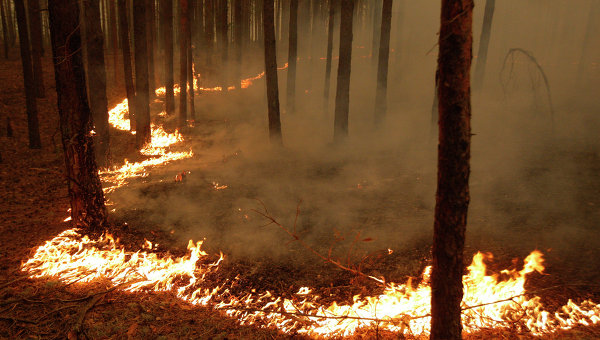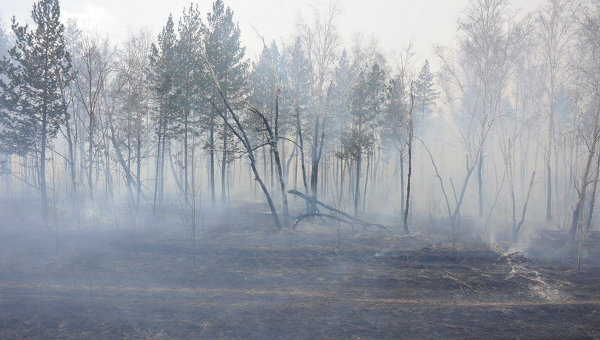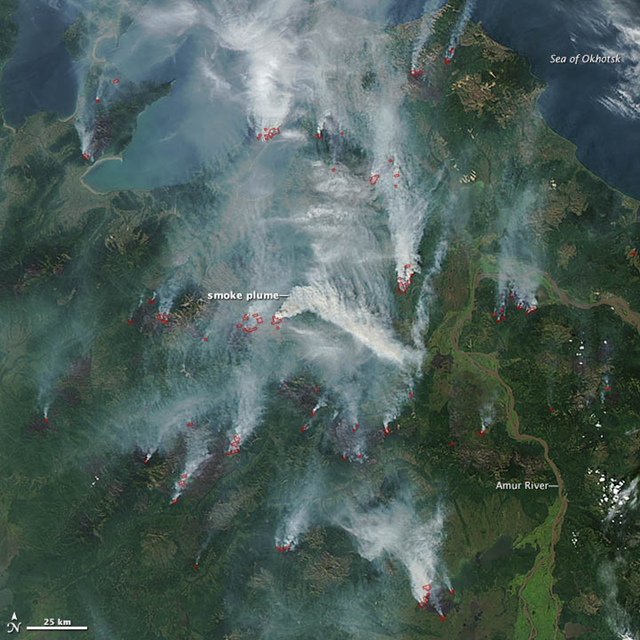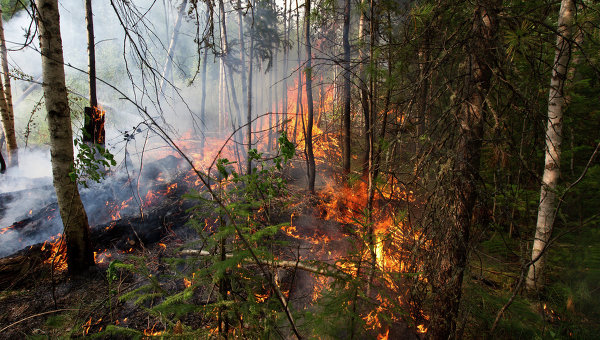Forest fires rage in Russian Far East – Tomsk firefighters ill-equipped, pilots on strike over back pay
On 28 August 2012, the Moderate Resolution Imaging Spectroradiometer (MODIS) aboard NASA’s Aqua satellite acquired this natural-color satellite image of several wildfires burning in the Khabarovsk region of eastern Russia. Red outlines indicate hot spots where MODIS detected unusually warm surface temperatures associated with fires. Large fires have burned across Siberia throughout the summer.
NOVOSIBIRSK, 23 August 2012 (RIA Novosti) – Firefighters extinguished all six forest fires over the past 24 hours that remained raging in Russia’s Siberia this summer, the regional forestry department said in a statement on Thursday. There are no more registered fires in the region, but the emergencies situation still remain in force in three areas of the Tomsk region due to the high risk of new wildfires outbreak, the statement added. Last month NASA quoted Greenpeace as saying that this year’s wildfires are worse than in 2010, when they engulfed most of central Russia, chocking the populous region with acrid smog. Also in July, smoke from wildfires in the taiga east of the Urals accounted for some spectacular sunsets in western Canada and the United States. More than 200,000 hectares of forest already burned down in Siberia and the Russian Far East, where fires are still raging, since the start of the summer.
All Forest Fires Put Out in Russia’s Siberia 
TOMSK, 7 August 2012 (RIA Novosti) – Firefighters battling rampant wildfires in Russia’s Tomsk Region in Siberia lack essential communication systems, equipment and heavy machinery, the region’s Deputy Governor Andrei Trubitsyn said on Tuesday. “In terms of concrete problems, the most important thing is the lack of communication systems and the second is equipment,” Trubitsyn said. “We have to change the wage and motivation system and we have to improve the food rations…And we absolutely do not have enough heavy machinery,” he added. Trubitsyn said an appeal to the Defense Ministry is being prepared, requesting the army to “donate heavy equipment to the forestry agencies.” His complaints come two years after Russia suffered devastating wildfires in the midst of the most severe drought in recorded history. The authorities faced a wave of criticism following the country’s poor reaction to the crisis, which devastated swathes of the country and left Moscow wreathed in smoke for weeks. The fires affected 22 regions, killing more than 50, leaving 3,500 homeless and causing over $15 billion in damage. As of Tuesday morning, 25 forest fires raged over 4,970 hectares in Tomsk region, of which 14 have been brought under control. There is no threat of the fires spreading to populated areas, but a state of emergency persists in the region. Andrey Kachin, an instructor in the firefighting paratrooper squad at Tomsk’s Bakchar forest protection department, said there is a drastic difference between how federal reserve employees and the local troopers are equipped and supplied. “[Federal Reserve commandos] have everything, they are dressed differently, their equipment is better. Unlike us, they have good boots and new tents. They probably eat just like we do, but they have drinking water supplies, while we drink water from the river,” Kachin said. Another firefighter, Aleksandr Butsenko, told RIA Novosti the standard food rations are “laughable.” “About 50 grams of sugar a day, 80 grams of condensed milk, 340 grams of corned beef per person … On the whole it’s enough, but we eat our own potatoes … We take water wherever it’s available – from a swamp, for example. There was a fire in the town of Krasniy Yar, and the nearest water was 17 kilometers away,” said Butsenko. The equipment issued to firefighters is of poor quality, he said. “Our boots soak up water, protective gear gets worn to shreds and there aren’t enough inflatable mattresses to sleep on,” he said. Russia’s Emergency Ministry has deployed Be-200 amphibious airplanes and converted Ilyushin Il-76 transport planes to help fight the fires.
Tomsk Firefighters Lack Equipment – Deputy Governor 
MOSCOW, 28 August 2012 (RIA Novosti) – Pilots from Russia’s Far Eastern Khabarovsk Territory are refusing to put out wildfires currently raging in the region over pay arrears that top 122 million rubles, the head of the local forest management department Alexander Lyubyakin said on Tuesday. The majority of wildfires triggered by the summer heat wave in Russia have been put out, but 11 wildfires with a total area of 838 hectares are still raging in Khabarovsk Territory. “Pay arrears are obstructing the firefighting effort in Khabarovsk Territory. Few planes are being used to douse the fires. Several aviation enterprises have refused to carry out their commitments because of the pay arrears,” Lyubyakin said. The territory’s deputy governor and finance minister have arrived in Moscow to discuss the situation with the Finance Ministry. “The ministry has yet not allocated the necessary sum from the federal reserve to compensate for the regions’ firefighting expenses,” a spokesman for Khabarovsk Territory’s forestry department said.

